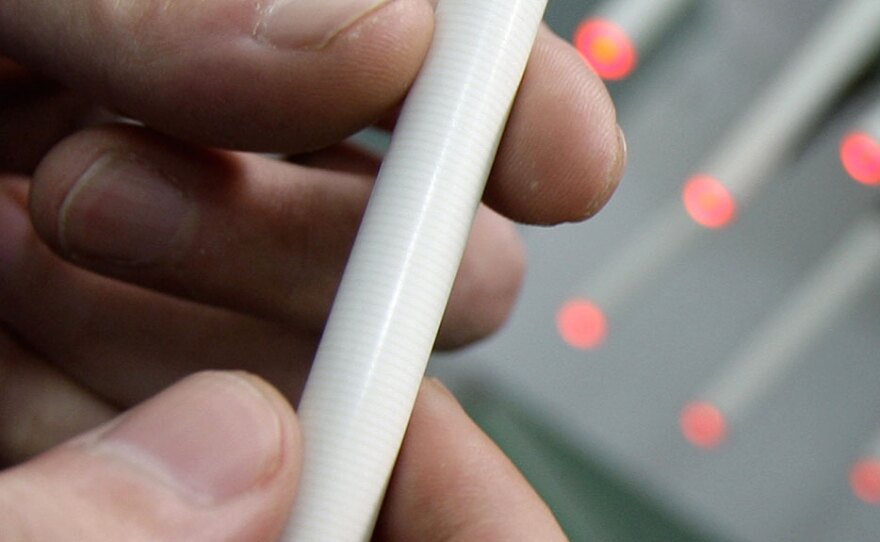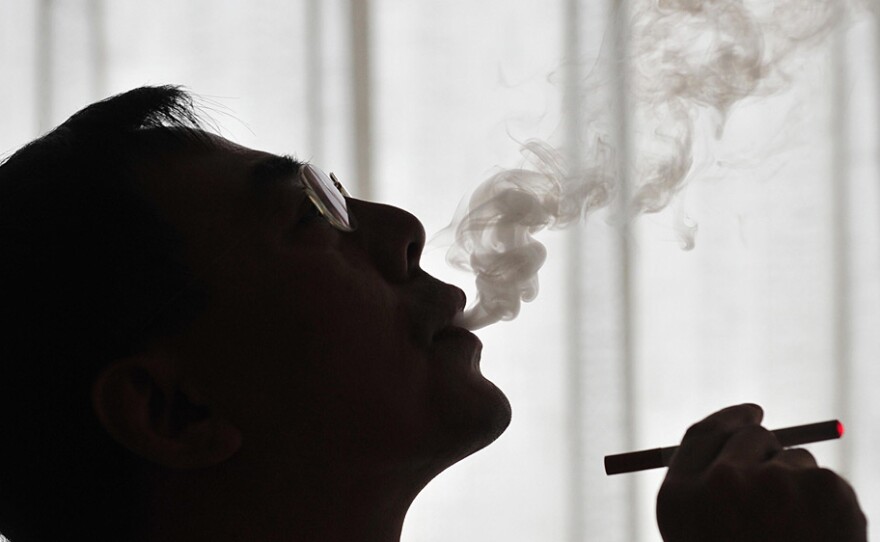
Electronic cigarettes imported from China have grown in popularity during the past several years — and that has concerned federal regulators, in part, because so little is known about what is in them.
Preliminary tests by the Food and Drug Administration show that e-cigarettes — battery-powered tubes that deliver a nicotine vapor instead of burned tobacco smoke — contain some of the same dangerous cancer-causing chemicals that traditional cigarettes do, but at lower levels. The samples also revealed quality-control issues.
FDA Deputy Commissioner Joshua Sharfstein says consumers should beware.
"Some products, which are marketed as exactly the same, have wildly variable amounts of nicotine in them," Sharfstein says. "One of the products has a poison in it — that is diethylene glycol. And what that indicates is that we don't really know much at all about the way these things are produced."
Sharfstein says e-cigarettes are subject to FDA approval as a drug or medical device, much like nicotine patches, gum and inhalers — and therefore they are illegal until they are cleared. The government has blocked e-cigarettes at the border, but has stopped short of closing down domestic retailers.
That means smokers can still find $40 to $100 starter kits at travel centers, mall kiosks and online.
How To Regulate?
The industry has sued the FDA, claiming it should not be regulated like a drug.
Walt Linscott, an attorney for Smoking Everywhere — one of two major importers of electronic cigarettes, cigars and pipes — says the e-cigarette is a tobacco product. And it should be regulated as such.
"It is a cigarette, and cigarettes inherent by their design and nature are not safe," Linscott says.
But as the company engages in a legal battle with the government, its very own telemarketers could be presenting a different picture to consumers, including marketing claims online. A Smoking Everywhere representative making a sales pitch said the product had been approved as safe by the FDA.
Linscott says that was a mistake that has been corrected.
The general confusion over whether e-cigarettes are safe prompted Oregon to get two travel centers to stop selling them in that state. E-cigarettes have banned by Israel, Australia, Canada and Mexico.
Should They Be Banned?
Anti-smoking advocates, like John Banzhaf with Action on Smoking and Health, are putting pressure on the FDA to ban the products in the U.S.
"If nothing is done to stop these and other similar products from being thrown on the market without any testing, without any guarantees, without disclosure or testing of ingredients, it basically opens the market to having smokers serve as guinea pigs," Banzhaf says.
There is a split in the public health community over this question similar to the abstinence-only debate in sex education: whether to advocate that smokers switch to less harmful products, even if they are not completely safe.
Boston University School of Public Health professor Michael Siegel says the FDA's recent consumer warning was misleading because the agency found low levels of carcinogens in e-cigarettes.
"It is comparable to what is present in nicotine-replacement products, which are on the market, and, in fact, if you look at the actual levels of the carcinogens in electronic cigarettes, they're about 1,400 times lower than in Marlboros," he says.
The FDA's Sharfstein, however, says it is premature to say e-cigarettes are safer until regulators know what is in them.
"It just may be that these products could help some people quit smoking, in which case the manufacturers have the opportunity to come to the FDA and demonstrate that with data," he says. "It's their obligation to prove that in order to market to the American people."
A federal judge in Washington, D.C., is holding a hearing later this month to determine just what their obligation is.
Copyright 2022 NPR. To see more, visit https://www.npr.org. 9(MDAzMjM2NDYzMDEyMzc1Njk5NjAxNzY3OQ001))







